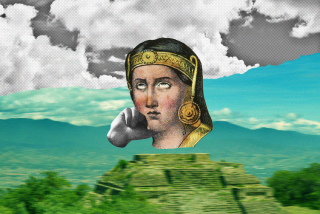COLUMN RIGHT/ MICHAEL S. BERLINER : Man’s Best Came With Columbus : Critics glorify the primitivism and collectivism of the American Indian. In fact, life was nasty, brutish and short.
- Share via
With an American Indian leading the 1992 Rose Parade on Wednesday as co-grand marshal, political correctness has won another victory. Parade officials caved in to critics who had denounced the tournament committee when it named as grand marshal Cristobal Colon, a direct descendant of Christopher Columbus. But the actual target of those critics was not simply Colon; it was Western civilization.
The politically correct view is that Columbus did not discover America, because people had lived here for thousands of years. Worse yet is the assertion that Columbus’ main legacy was death and destruction. Pasadena’s vice mayor, Rick Cole, made this hatred of Western civilization manifest when he branded Columbus’ descendant “a symbol of greed, slavery, rape and genocide.”
Did Columbus “discover” America? Yes, in every important respect. This does not mean that no human eye had been cast on America before 1492. It means that Columbus brought America to the attention of the civilized world--that is, to the civilizations of Western Europe, which were then emerging into an era of great creativity, scientific achievement and philosophical ferment. The result, ultimately, was the United States of America.
It was Columbus’ discovery that two continents existed between Western Europe and Asia that led to the influx of people and ideas on which this nation was founded--and on which it still rests. The opening of America to Western Europeans brought a global extension of the ideas and achievements of Aristotle, Galileo, Newton and thousands of thinkers, writers and inventors.
Before 1492, what is now the United States was sparsely inhabited, unused and undeveloped. The inhabitants were primarily wandering hunter/gatherers, living hand-to-mouth and day-to-day. There was virtually no change, no growth for thousands of years. There was no wheel, no written language, little agriculture and scant permanent settlement; but there were endless, bloody wars. With rare exception, life was nasty, brutish and short.
Whatever the problems it brought, the vilified Western culture also brought enormous, undreamed-of benefits, without which most of today’s Indians would be infinitely poorer or not even alive.
Columbus should be honored, for in so doing, we honor Western civilization. But the critics do not want to bestow such honor, and this is the real reason for the opposition to celebrating Columbus as the discoverer of America. The critics’ real goal is to denigrate the values of Western civilization and to glorify the primitivism, mysticism and collectivism embodied in the tribal cultures of American Indians. They decry the glorification of the West as “Eurocentrism.” We should, they claim, replace our reverence for Western civilization with multiculturalism, which regards all cultures as morally equal. In fact, they aren’t.
Some cultures are better than others: A free society is better than slavery; reason is better than brute force as a way to deal with other men; productivity is better than stagnation. In fact, Western civilization stands for man at his best. It stands for the values that sustain human life: reason, science, self-reliance, individualism, ambition, productive achievement. The values of Western civilization are values for all human beings; they cut across gender, ethnicity and geography. We should honor Western civilization not for the ethnocentric reason that some of us happen to have European ancestors but because it is the objectively superior culture.
Underlying the political collectivism of the anti-Columbus crowd is a racist view of human nature. They claim that one’s identity is primarily ethnic: If one thinks one’s ancestors were good, one supposedly will feel good about oneself; if one thinks one’s ancestors were bad, one will feel self-loathing. But it doesn’t work; the achievements or failures of one’s ancestors are monumentally irrelevant to one’s worth as a person. Only the lack of a sense of self leads one to look to others to provide what passes for a sense of identity. Neither the deeds nor misdeeds of others are our own; we can take neither credit nor blame for what someone else chose to do. There are no racial achievements or racial failures, only individual achievements and individual failures. One cannot inherit moral worth or moral vice. “Self-esteem through others” is a self-contradiction.
Individualism is the only alternative to the racism of political correctness. We must recognize that every person is a sovereign entity, with the power of choice and independent judgment. The values of self-esteem and Western civilization should be proudly proclaimed.
More to Read
Sign up for Essential California
The most important California stories and recommendations in your inbox every morning.
You may occasionally receive promotional content from the Los Angeles Times.













